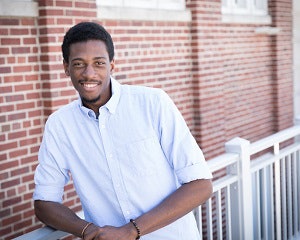Since 1968, the Afro-American Cultural Center at the University of Iowa has served as a welcoming and empowering space for the university’s Black students, faculty and staff to find community, engage in activism, receive support and culturally engage with others on and off campus.
 Jamal Nelson
Jamal NelsonKnown as Afro House, the center is a space for Black and non-Black students alike to learn about what it means to be a Black person in the world. Over the years, the center has offered programming such as the “Being Black at Iowa” project and Hair to Heart, which not only opens the door for more honest conversations, but also develops students into leaders who have an understanding of their cultural identity, officials said.
“As the years have gone by, society hasn’t fully changed, but this space will always be needed because of the way that society started to evolve,” said Jamal Nelson, coordinator of multicultural programs at the University of Iowa. Afro House continues to be a space that develops leaders, a space that cultivates collaboration between campus partners and a space that “is about the Black community and about the Black experience. And the Black experience does not mean just African-Americans domestically here; we’re also talking about the African Diaspora – all folks who identify in any way as African or African American. This is what this space is here for.”
Although Afro House has evolved with the times, Nelson said Black alumni can still reflect on their college days or visit today and see that in some ways, the house has remained the same.
Dr. Venise Berry, an associate professor of journalism, notes that in the early days of the house during the Civil Rights era, there was more solidarity amongst African-American students.
When Berry first arrived at the university as an undergraduate in the early 1970s, she said Afro House was physically a house where students had dinners, barbeques, parties, study sessions and more together. The director of the house even lived in the upper level, she said.
Over time, Afro House has evolved to become more of a cultural resource center for students, Berry said. The house now includes updated technology and entertainment, a living and dining room, game and study rooms, a library and a fully-stocked kitchen.
“For each generation, it’s different. It has a different purpose,” Berry said of Afro House’s evolution. However, “there’s a consistency in being in a place where students can go and find like-minded students and feel comfortable and supported. That’s been consistent from the 1960s to now. It’s still there to serve the students in a variety of ways. It gives them a sense of belonging.”
 Dr. Venise Berry
Dr. Venise BerryCurrently, Black students make up three percent of the university’s population of more than 33,000 students. A number of student and faculty organizations affiliate with Afro House such as the Black Student Union, the Caribbean and African Student Associations, Sista Speak, the Hubbard Scholars, several Black Greek Letter Organizations and the African American Council for faculty and staff.
When Nelson runs educational or social programming and events, he first and foremost ensures that students and other campus members understand that the Black experience is not monolithic.
“It is versatile. It’s transformative, it’s influential,” Nelson said of his message to students. He also tells them that they matter not only because they are students, but also because “history shows you that your culture is valued. Your culture has not only commercial value, but also historical value, development value, culture change value. Everything that we have done or seen in this world has, in some way, been shaped or formed or touched by someone of African descent.”
Such messages resonate with the wider campus community, particularly as the university is making “serious efforts” to improve diversity on campus, Berry said. The creation of Afro House also served as a catalyst for the opening of other cultural centers on campus as recently as the early 2000s.
“There’s not a huge cultural mecca here. African-American students who come here have to understand that this is Iowa, not Chicago or New York or D.C.,” she said. “But at the same time, because Iowa is Iowa, [the school] really does try. They make a serious effort to recruit minority faculty and maintain them and try to bring students in.”
What Nelson hopes non-people of color takeaway from the legacy and impact of Afro House is an understanding of what Black students and people face in their everyday lives navigating predominantly White spaces.
For many Black students, “they’re always in the space of discomfort. They’re always in the space of navigation and understanding and learning, where they have to completely rework who they are for some people and some rooms just so that they can be okay, so that they can be safe,” Nelson said. “For other folks, when they walk into the Afro House, when they walk into any of the events that we do that are connected to this, that’s the mindset they’ve got to have and that’s the mindset that they’re going to learn … that ‘I might be uncomfortable because I don’t identify as Black, but that does not mean that I should not step into this space, learn how to navigate it, learn what’s happening and learn the people, and then understand the people.’ That’s what you’re here for.
“That’s essential to college life; that’s essential to education itself,” he said.
Tiffany Pennamon can be reached at [email protected]. You can follow her on Twitter @tiffanypennamon.















